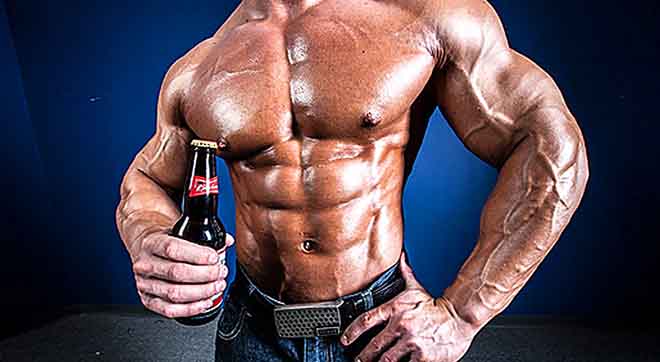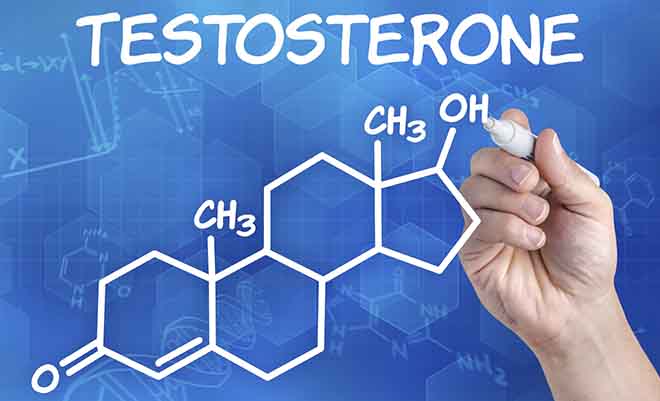 Many of us enjoy a cheeky drink now and then. But are you aware of the impact alcohol can have on your testosterone levels? Beer, wine, and even supposedly ‘healthy’ spirits can play havoc with hormone production, not to mention your waistline. If you’re looking to get or maintain a lean, muscular physique, then watching your alcohol intake should be high on your list of priorities. In this article, we look at how drinking can affect your testosterone levels and the impact this has on your body.
Many of us enjoy a cheeky drink now and then. But are you aware of the impact alcohol can have on your testosterone levels? Beer, wine, and even supposedly ‘healthy’ spirits can play havoc with hormone production, not to mention your waistline. If you’re looking to get or maintain a lean, muscular physique, then watching your alcohol intake should be high on your list of priorities. In this article, we look at how drinking can affect your testosterone levels and the impact this has on your body.
Testosterone & alcohol
Unfortunately, consuming alcohol isn’t going to help. It suppresses the production of testosterone and slows down its release. This means that drinking alcohol will steadily decrease your t-levels as well as sabotaging your efforts to stay lean. Without sufficient testosterone, you’ll struggle to get the results you want in the gym and in the bedroom.

How it affects your metabolism
When you consume alcohol, your body goes into an internal meltdown. Most people can deal with one or two drinks, but any more than that and your body has to act fast. You might not realize it, but you’re flooding your system with a substance that it finds toxic. So, it goes into overdrive trying to expel as much of it as possible (which is one of the reasons you start to pee more).
When your body perceives a threat, it starts to shut down non-essential processes and focus on survival. Your metabolism instantly switches from burning macronutrients (like carbs, fat, and protein) to breaking down and expelling the alcohol. This means that anything you would have normally burned is immediately shunted into storage. The result is either more body fat or greater glycogen stores and water retention. Either way, you immediately begin to pack on the pounds while your body deals with the alcohol.
Alcohol & weight gain
Alcohol contains 7 calories per gram, almost double the amount found in carbohydrate and protein. Because it’s so energy dense, you can quickly overload on calories when you’re out drinking for the night. But it’s not just this direct effect that’s concerning – alcohol also lowers your inhibitions and stimulates your hunger. Two hormones in particular; leptin and ghrelin, become more active which makes you feel super-hungry. This means that you’re more likely to overeat unhealthy junk foods after drinking. Plus, most of us also munch on high-fat and high-carb meals in an effort to cure our hangovers the next day. This contributes to further weight gain and is a devastating one-two punch for your system. If you end up skipping the gym because you’re feeling too rough, then the effect is even greater.
Plummeting testosterone levels
Unfortunately, that’s not the end of the story. If you drink alcohol on a regular basis then you’re likely to gain excess weight, particularly around your midsection. The classic beer belly doesn’t just undermine your work at the gym – it will decrease your testosterone even further. Abdominal fat contains an enzyme that suppresses t-levels and increases estrogen (which is why some guys develop ‘man boobs’ from drinking). So, the more weight you gain around your middle, the lower your testosterone levels become. And the less of this hormone you have, the harder it is to build lean muscle mass. This means that your metabolism slows and it’s harder to burn calories, so your weight can begin to spiral. It also increases your risk of other chronic diseases like diabetes, cardiovascular conditions, and cancer.
How to increase testosterone
The good news is, there are lots of practical ways you can recover your testosterone levels. Avoiding alcohol is the obvious step but other aspects of your diet and lifestyle can play a significant role. Taking multi-vitamins or a Testogen supplement may also help.
Here are a few simple steps you can take to increase your testosterone levels:
- Strength training – lifting heavy weights stimulates testosterone production, so push yourself as hard as possible in the gym.
- Healthy fats – eating plenty of healthy fats like avocados, oily fish, seeds, and nuts will ensure that your body has the nutrients it needs to produce and transport hormones.
- Decent sleep – getting good quality sleep supports your natural hormone cycles and reduces cortisol production (which suppresses testosterone).
- Vitamin D – the sunshine vitamin supports t-levels, so spend at least 10-15 minutes outdoors every day or take a multi-vitamin.
- Testosterone boosters – stimulate your body to increase its natural testosterone production and boost levels.
The link between alcohol & testosterone – Summary
Consuming alcohol directly suppresses testosterone production and causes excess weight. It forces your body to switch from fat-burning mode to expelling the poisonous toxins, which can quickly lead to weight gain. It also stimulates hunger hormones that trick you into wanting to eat more and make poor food choices. As you gain weight around your mid-section, enzymes are produced that further decreases your t-levels and make it harder to develop lean muscle.
Reducing your alcohol intake is the best way to directly address this. Lifestyle changes such as getting more sleep and lifting heavy weights can support testosterone production. Adapting dietary habits by eating more healthy fats and taking supplements can also help. By making these tweaks to your daily routine, your body will soon recover its testosterone levels to where they once were. This will enable you to get the most out of your workouts and nutrition, so you achieve the lean, muscular physique you’ve always wanted.
 IBB – Indian Bodybuilding IBB – Home of Indian Bodybuilding and Fitness
IBB – Indian Bodybuilding IBB – Home of Indian Bodybuilding and Fitness




